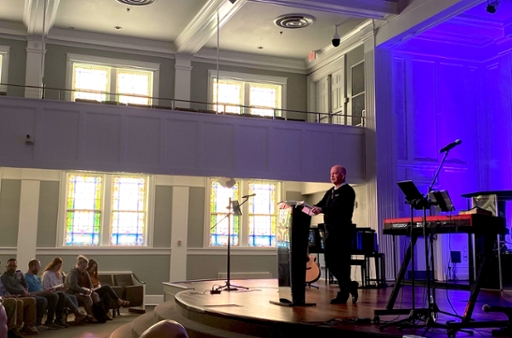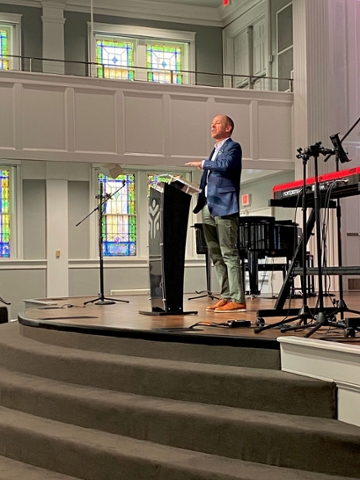Staying on Mission: SEBTS Hosts Regional Conference in the Upstate
Chad Burchett | October 27, 2022

On Monday, October 24, Southeastern Baptist Theological Seminary hosted its second annual regional conference at First Baptist Greer in upstate South Carolina.
“Southeastern exists to serve the Church and fulfill the Great Commission,” noted Southeastern President Danny Akin. “We believe that we best serve local churches by equipping biblically faithful and theologically grounded students who are passionate about the Great Commission. It is a great joy to do just that in partnership with local churches and ministry leaders in our region, which makes our regional conference at First Baptist Greer such a sweet time to gather around God’s word together and encourage each other to be committed to the ministry God has called each of us to steward.”
We believe that we best serve local churches by equipping biblically faithful and theologically grounded students who are passionate about the Great Commission.
Designed to encourage and equip local church and ministry leaders, this year’s regional conference challenged attendees to remain faithful to God’s word and mission; to navigate seasons of ministry in partnership with fellow local churches; and to benefit from Southeastern’s global resources for biblical, theological, and ministerial training.
In the first plenary session, Akin addressed the role of expository preaching in church ministry, encouraging pastors to preach Christ-centered expository sermons. “Whether you are planting a church, revitalizing a church, or serving an established church, the method of preaching that honors God and will serve your people best is expository preaching,” charged Akin. The preacher must allow the text of Scripture to determine the structure, substance, and tone of the sermon.

Because God builds his Church by the power of the Spirit through his word, the preacher must be a faithful mouthpiece of the word of God. One central way preachers remain faithful to Scripture is by preaching Christocentrically, Akin reminded attendees. “All of the Bible is Christian Scripture, so we must preach Christ in all Scripture,” shared Akin. “Faithful exposition is historical, grammatical, syntactical, theological, and Christological.”
Following Akin’s message, attendees enjoyed two rounds of breakout sessions on various topics related to local church ministry. The first set of breakouts included How to Keep Focus in Times of Transition with Wayne Bray, The Pastor and His Family with Cliff Marshall, and Cooperation through Association with Travis Kerns. The second set of breakouts included Evangelism in the Twenty-first Century with Lee Clamp as well as two breakouts featuring Southeastern staff and professors: Ministry Burnout with Tate Cockrell and Theological Education in the Local Church with Keith Whitfield and Chris Thompson.
“At Southeastern, we want to make sure theological education is accessible and ministry-focused,” Southeastern Provost Whitfield shared with attendees. “We want at least three things to characterize all our graduates: They are disciple-makers, they are consumed with a global focus, and they are equipped to endure a lifetime of ministry.” Introducing Southeastern’s Equip Network, Thompson and Whitfield also explained how local pastors, church leaders, and interested students can be involved in Equip’s flexible, church-based pathway at Southeastern.
We want at least three things to characterize all our graduates: They are disciple-makers, they are consumed with a global focus, and they are equipped to endure a lifetime of ministry.
During a lunch sponsored by the North American Mission Board (NAMB), Whitfield moderated a panel on church revitalization to help local pastors triage warning signs of mission drift and navigate steps toward renewal. Panelists included Doug Mize, Pastor of First Baptist Greer; Gary Hollingsworth, Executive Director-Treasurer of the South Carolina Baptist Convention; Tim Dowdy, Executive Director of Evangelism and Leadership for NAMB; and Keelan Cook, Director of the Center for Great Commission Studies at Southeastern.
The heart and mission of a local church are key indicators of its health. “When a church loses its heart, it needs to be revitalized,” noted Dowdy. “When you become detached from your community and you don’t see people coming to Christ, the church needs to be revitalized. There are many strategies for getting back on mission, but they are no substitute for a revitalized heart.”

Addressing “next steps” toward renewal, Cook urged pastors to connect and cooperate with other local churches, to seek trusted counsel outside the congregation, and to pray personally and corporately for spiritual renewal. The pastor’s spiritual and relational labor is essential to local church renewal and growth, noted Hollingsworth: “We can never pay someone else to do the spiritual discernment that belongs to us.”
In the second plenary session, Jay Hardwick, Pastor of Forest Hills Baptist Church in Nashville, TN, preached from Acts 18, calling attendees to celebrate God’s gifts in ministry even in difficult seasons of stress, fatigue, and frustration. As Hardwick reminded attendees, gospel ministry is a weighty task made even more urgent by its context of spiritual warfare. “We are on the frontlines of spiritual battle,” commented Hardwick. “There is a kingdom of darkness warring against a kingdom of light.”
Because ministry is done in the context of spiritual warfare, Hardwick urged pastors not to minister alone: “No matter where we might be, no matter where we might serve, no matter what the Lord has called us to do, we cannot do ministry alone.” Not only do Christians need to be encouraged and held accountable by one another to remain faithful, but also, they need the strength that only God can provide and the reassurance that only his presence can offer his people as they live life on mission. “There is never a time when we are more aware of God’s presence than when we are on mission,” Hardwick encouraged attendees.
There is never a time when we are more aware of God’s presence than when we are on mission.
“As we look across the landscape of the Southern Baptist Convention, we see many Southern Baptist churches plateauing or declining and some even closing their doors,” noted Akin. “This grieves my heart. That is why teaching on church revitalization and healthy biblical ministry is so urgent and timely. At our regional conference in the Upstate, we did just that, challenging church leaders to walk worthy of their calling, to think biblically, and to live missionally as they lead and revitalize churches.”
Organized by Southeastern’s Church and Convention Relations team, the regional conference provides a space for churches throughout the Southeast to connect with the school, to hear about current educational opportunities, to be equipped and resourced for ministry by Southeastern staff and faculty, and to experience for themselves the high quality biblical and theological training available to students at Southeastern. The regional conference also offers a time to reconnect with alumni and be introduced to prospective students. Next year’s spring regional conference will be hosted in the greater Nashville area (more details to follow). To learn more about how your church or convention can partner with Southeastern, contact Drew Davis at [email protected].